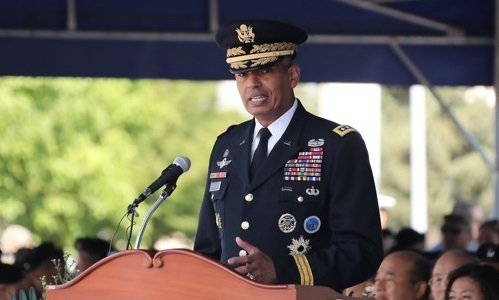The top US commander in South Korea on Thursday stressed that the US advanced anti-missile system deployed here will bring a critically important and unprecedented opportunity to boost area defense capability against North Korea‘s ballistic missiles.
Speaking at a forum in Seoul, Vincent K. Brooks, commander of US Forces Korea, pointed out allies’ “vulnerability” against the communist regime’s escalating missile and nuclear threats.
“North Korea is not yet deterred in the direction it is heading and the pressure is not high enough to cause the change of the direction,” said Gen. Brooks in a security seminar in Seoul, adding that North Korean leader’s continued defiance of international sanctions could constitute a “very dangerous condition.”
 |
Vincent K. Brooks speaks at a ceremony marking Memorial Day at the USFK base in Yongsan, central Seoul, on May 25, 2017. (Yonhap) |
He suggested that the allies should come up with a step to take away the “leverage” that North Korea holds against them, but warned against the danger of using military forces to eliminate its weapon system entirely.
“I’m not suggesting that we allow him to keep his weapons. We have to address the vulnerability we have in the Republic of Korea and find ways to lessen that vulnerability.”
“(The allies should) think of ways to take the leverage that Kim Jong-un has in holding the Republic of Korea and surrounding states at risk (and) to take the risk away without taking the systems away,” said the commander.
Regarding the Terminal High Altitude Area Defense system, Gen. Brooks reiterated that its early deployment here is all about reducing that leverage.
“(The deployment of THAAD) is the alliance’s decision based on the current situation which continues to get worse especially with regards to ballistic missiles and it was done as quickly as we could do,” said the commander.
“You know the defense has no timeline. This is how we have THAAD. That is all about North Korean missiles and the threat that North Korean missiles posed to the Republic of Korea and further defense of the Republic of Korea. Nothing else.”
The remarks were seen as intended to quell escalating controversy over THAAD after the US President Donald Trump had requested South Korea pay $1 billion for the system. South Korea’s President Moon Jae-in has vowed to put the measure to parliamentary ratification.
Despite the change of leadership both in the US and South Korea, the commander highlighted Washington’s security commitment to South Korea will remain “iron-clad,” saying his superiors at Pacific Command and Joint Chiefs of Staff are “very responsive” for his quest for reinforcement.
The commander also lauded Seoul’s defense contribution to the security alliance, describing South Korea as an “exemplary” ally as it continues to modernize key military systems like modernization of Patriot missile defense systems and adoption of AH-64E Apache Guardian.
“We see (South Korea‘s) commitment to the defense spending about 2.7 percent of gross domestic product… This is exemplary as we look around the world and set of alliances we had… there is no one who holds a higher example than the Republic of Korea,” said the commander.
By Yeo Jun-suk (
jasonyeo@heraldcorp.com)








